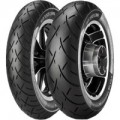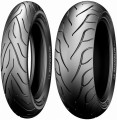The axle on which this tyre is recommended to be mounted.
In the vast majority of modern motorcycles, the
front wheel is steering, and the
rear wheel is driving; in addition, the rear wheel usually bears more weight. Accordingly, the features of the work of both axes will also be different. So, the front tyre has to turn in different directions along the course, and the rear one has to be subjected to increased loads in terms of weight and twisting along the main axis of rotation, in addition, it must “cling” well to the road in order to avoid slipping. In light of all this, putting tyres on a "non-native" axle is highly undesirable: it will work in an emergency mode, and the consequences can be very deplorable. At the same time, there are
universal models suitable for both the front and rear axles (although they can cost more than specialized ones, and at an equal cost, they can be inferior to them in terms of individual characteristics).
—
Chamber (TT). Tyres, consisting of a tyre and an internal sealed chamber into which air is pumped. Despite the "double walls", such tyres are inferior in reliability to tubeless ones — they quickly release air when punctured, and in general they have more modest performance characteristics. At the same time, chamber tyres also have advantages: they are insensitive to rim deformations and retain their tightness even when there is a gap between the rim and the tyre. Thus, there are two main areas of application for such tyres today. Firstly, these are spoked wheels, where the rim does not provide tightness and you cannot do without a chamber; such wheels are installed on many east european motorcycles, as well as some choppers. Secondly, tube tyres are used by some extreme riders or long "
enduro " style travel enthusiasts (see "Directionally").
—
Tubeless (TL). Tyres that do not use an inner tube — the air in such models is pumped into the space between the tyre and the wheel rim. This design requires a one-piece rim that does not allow air to pass through, and only works properly on cast wheels, without spokes. On the other hand, the vast majority of modern motorcycles are equipped with such wheels. Tubeless tyres are considered more reliable and safer than tube tyres, they tolerate punctures better (in particular, they hold air longer), and they are easier to rep
...air. Therefore, in general, such tyres are preferable to tube tyres (with the exception of some specific cases described above).
— TT/TL. Tyres that can be installed in both tube and tubeless ways — depending on which option is required in this case, taking into account the type of wheel and application.
